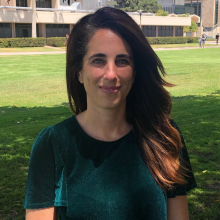Ehrlich and Darmstaedter Prize to Prof. David Wallach
Prestigious award recognizes work on key signaling events in inflammatory and autoimmune diseases
Briefs

The Weizmann Institute’s Prof. David Wallach will receive the prestigious Paul Ehrlich and Ludwig Darmstaedter Prize in March, recognizing his pioneering role in elucidating the molecular mechanisms that contribute to chronic inflammatory and autoimmune diseases and in applying this knowledge to therapy.
Prof. Wallach, of the Department of Biomolecular Sciences, will join an impressive list of preeminent scientists who have received one of Germany’s most prestigious medical research awards. His groundbreaking work revolves around the protein known as “tumor necrosis factor,” or TNF, a natural immune hormone—also called a cytokine—crucial to the inflammatory process and other immune-defense mechanisms.
In the 1980s, Prof. Wallach became one of the first researchers to isolate TNF—a discovery that led to the identification of several related cytokines that are now defined as the “TNF superfamily.” Several members of this superfamily, including TNF, have a unique cytotoxic ability by which they destroy tumor cells. They also have a variety of other functions, which contribute to practically all aspects of immune defense. While TNF is necessary for the body’s immune function, its excessive action during certain autoimmune or infectious diseases may promote uncontrolled inflammation and cause serious damage to tissues and organs.
Prof. Wallach suspected, based on his studies of the mechanisms of the cellular response to TNF, that the body must also produce inhibitors of TNF function, which would prevent the binding of TNF molecules to TNF receptors on tissue cell membranes. Such regulatory activity, he assumed, would thwart the initiation of inflammation. He identified two such inhibitors in body fluids and then clarified that these inhibitors are soluble forms of two cell-surface TNF receptors that transfer TNF’s messages into the cell. His discoveries have led to the development of improved drugs for the treatment of chronic inflammatory diseases.
Today, Prof. Wallach’s research focuses on investigating the mechanisms and molecules involved in the function of TNF, and the proteins related to it. His laboratory discovered one of the main molecular pathways of programmed cell death—the extrinsic cell death pathway—and cloned its components. He also discovered several signaling proteins that play key roles in induction of inflammation and other immune functions. These new insights are helping scientists understand inflammatory and autoimmune diseases, as well as the development of certain cancers, such as neuroblastoma, small cell lung carcinoma, multiple myeloma, and pancreatic carcinoma.
Prof. Wallach will receive the Paul Ehrlich and Ludwig Darmstaedter Prize together with American medical researcher and entrepreneur Dr. Anthony Cerami, who pioneered the study of several pathological consequences of TNF function. The prize honors recipients annually in Frankfurt on March 14, the birthday of Nobel laureate Paul Ehrlich, a German-Jewish physician known for his trailblazing discoveries in immunology, hematology, and chemotherapy, as well as the first effective treatment for syphilis.
The Paul Erlich Foundation, managed by the Association of Friends and Sponsors of the Goethe University, awards the prize to scientists who have made a significant impact in Ehrlich’s fields of research—particularly in immunology, cancer research, microbiology, and chemotherapy.








